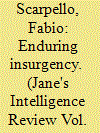| Srl | Item |
| 1 |
ID:
097110


|
|
|
| 2 |
ID:
102133


|
|
|
| 3 |
ID:
099470


|
|
|
| 4 |
ID:
085028


|
|
|
| 5 |
ID:
157227


|
|
|
|
|
| Summary/Abstract |
In the past two decades, a burgeoning plural policing literature has refocused the attention on the plurality of sponsors and providers that populate policing landscapes throughout the world. This article coheres and advances this research agenda in two ways. It provides the first critical examination of its conceptual and theoretical achievements, while also highlighting important gaps that remain in explaining how struggles over the political economy affect plural policing and vice versa. This requires applying political economy questions about power and resources to policing—“how,” by “whom,” and especially for “whose” benefit policing is delivered—and conceptualizing policing as one aspect of state–society relations. The article further elucidates strengths and weaknesses of the plural policing literature in a case study of Indonesia’s contemporary plural policing landscape. The importance of plural policing goes beyond academic endeavor. Indeed, plural policing is ubiquitous throughout the world and affects how security is provided, and power exercised, in most social realms whether at local, national or international level. It is thus a phenomenon difficult to ignore for comparative politics, IR scholars, and policymakers alike.
|
|
|
|
|
|
|
|
|
|
|
|
|
|
|
|